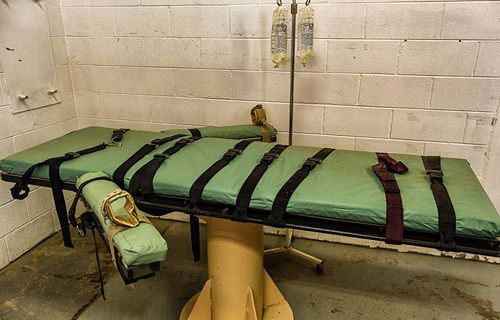Not only could the nearly two-hour execution of an Arizona inmate last week have been avoided, but the number of botched deaths by lethal injection is increasing in the U.S., says one observer. “The problems that occurred in the execution of Joseph Wood on July 23 should have been foreseen and prevented,” Richard Dieter of the Washington, D.C.-based Death Penalty Information Center told CNA July 25. He said that the rate of failed executions is “greater than any other year since the death penalty was reinstated in 1976.” “Over 1,000 lethal injections were conducted earlier with only comparatively minor problems,” Dieter noted. “It is the secrecy and experimentation with new drugs that is causing the increased number of botched executions.” On July 23, Arizona prison authorities executed Joseph Rudolph Wood by lethal injection at the Arizona State Prison Complex in Florence. The injection of lethal drugs took place at 1:52 p.m. after the man was strapped to a gurney. The inmate wheezed hundreds of times before he was pronounced dead at 3:49 p.m. Doctors confirmed several times throughout Woods’ execution that he was sedated. Arizona Republic reporter Michael Kiefer, who witnessed the execution, said that Wood’s mouth opened thirteen minutes after the injection. “Three minutes later it opened again, and his chest moved as if he had burped. Then two minutes again, and again, the mouth open wider and wider. Then it didn't stop,” Kiefer wrote. “He gulped like a fish on land. The movement was like a piston: The mouth opened, the chest rose, the stomach convulsed.” Witnesses could see, but not hear, the execution. However, when the doctor in the execution chamber confirmed through a microphone that Kiefer was still sedated, Kiefer reported hearing sounds from Wood: “a snoring, sucking, similar to when a swimming-pool filter starts taking in air, a louder noise than I can imitate.” Wood’s lawyers left during the execution to file emergency legal motions to halt the execution. Wood was sentenced to death for the fatal shootings of his ex-girlfriend Debra Dietz and her father Eugene Dietz in 1989. Witnesses of the execution included the murder victims’ relatives. A priest was present at the execution. Before the execution, Wood told the victims’ relatives he was thankful for Jesus Christ as his savior, the Associated Press reports. At one point he smiled at them, an action that angered the family members. Executions through lethal injection typically last 10 minutes when barbiturate drugs are used, the Arizona Republic said. Companies have begun to refuse to sell these drugs to correction departments following protests from death penalty opponents. In response, states that still perform executions now use other drugs. Arizona is using the sedative drug midazolam in combination with the narcotic hydromorphone. The sedative was first used for executions less than a year ago. Dieter said that the Arizona government had “ample warning” that midazolam might cause problems, noting the drug’s apparent connection to drawn-out executions by lethal injection in Ohio and Oklahoma. “If the state had opened up its process to broader review, they might have heard from experts in anesthesiology and pharmacology who would have recommended changes to avoid the prolonged and inhumane way in which Wood was executed,” he said. Stephanie Grisham, a spokeswoman for Arizona Attorney General Tom Horne, blamed protests of drug manufacturers for forcing the state to turn to other drugs. Dieter said that the sodium thiopental drug Arizona previously used was taken off the market due to objections from workers at the Italian plant that manufactured the drug for its supplier, Hospira. “Subsequent drugs, such as pentobarbital, which Arizona also used, were taken out of circulation for executions because of the European human rights' stand against the death penalty,” he added. “To blame Europe for the botched executions seems strangely ironic. Should they have violated their conscience and helped facilitate executions? Arizona should have foreseen what happened and avoided it. They chose not to.” In April, the Oklahoma execution of convicted murderer Clayton Lockett lasted 43 minutes. Lockett writhed and breathed heavily, eventually dying of a heart attack. Archbishop Paul Coakley of Oklahoma City on April 30 called for a reconsideration of the death penalty, saying “in general, there are others ways to administer just punishment without resorting to lethal measures.”

